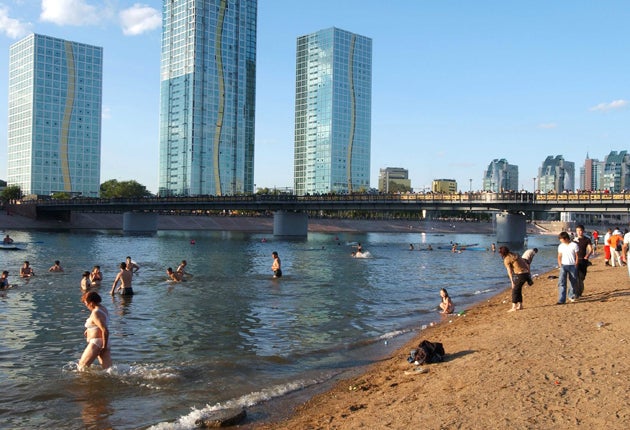Welcome to the new frontier – Central Asia
UCL is setting up shop in Kazakhstan but critics are worried about that nation's human rights record. Lucy Hodges reports

Fresh from setting up a campus in Australia, one of Britain's top higher education institutions, University College London, is turning its attention to Kazakhstan, a vast country bordered by Russia, Uzbekistan and China and made famous by Ali G's Borat.
But there is nothing remotely silly or satirical about UCL's foray into Central Asia. The university is planning to help the Kazakh government establish an international university in Astana, the new capital of the country. Specifically, it is assisting on a one-year foundation programme to get science and engineering students up to the right level for university degree programmes to be taught in English.
The new University of Astana will start in autumn 2009 as a high-quality, research-led, global institution. UCL will teach maths and physics to up to 120 students to prepare them for a four-year BSc in information and computer technology.
"Kazakhstan is emerging as a key strategic partner for the UK," says Professor Michael Worton, UCL's vice- provost who has been brokering the deal. "It is also a country which is committed to modernisation and internationalism and it has enormous natural resources. It believes that education is one of the key ways of mobilising its resources, both human and natural."
Not everyone is happy with the move because of Kazakhstan's human rights record. Several opposition leaders and journalists have been killed recently, and Western observers do not consider the country's elections to be free and fair. But Kazakhstan, rich in oil and gas, has been booming economically and is now considered to the dominant state in central Asia.
UCL clearly believes that a university can do more to change attitudes by engaging with a country than by remaining aloof. Moreover Worton suggests that Kazakhstan is no more to be criticised than China or countries in South America and the Middle East. "We can't play our part in making the world a more liberal place by doing it from the outside in a neo-colonial way, saying we have the answers," he says. "We have to get in there." The move shows the extent to which British universities are now seeing themselves as global players, not only taking students from all over the world but reaching out to help overseas universities build up their capacity. In the Middle East, UCL is also active and is expected to announce shortly that it is creating a small campus to teach archaeology and cultural heritage.
The aim in Kazakhstan is to create a university that will become an education hub for central Asia. The country has plenty of other universities but they are not world class and the Kazakhs want a Westernised curriculum with a year's study abroad as part of the undergraduate programme.
"But this has got to be a Kazakh university," says Worton. "The Kazakhs have to build it. I told them it would take a lot longer than they thought but they would get a real university of their own making embedded in central Asia."
This philosophy may be one reason why UCL won the contract in competition with the Universities of Cambridge in Britain, Stanford and Carnegie Mellon in the USA, and the National University of Singapore.
UCL's adventures abroad are just one aspect of its internationalism. Branded "London's global university", UCL has a high proportion of foreign students (30 per cent) and deliberately tailors its courses to reflect that. To that end, it has produced a booklet on the kind of students it hopes to produce and what it means to be educated as a global citizen.
It has even persuaded its academics to agree on what characteristics it hopes to produce in its graduates. There are six of these. UCL wants to produce critical and creative thinkers who are ambitious as well as idealistic, and sensitive to cultural difference. It wants its graduates to be entrepreneurs and prepared to assume leadership roles – and to be highly employable.
The issue that provoked most controversy among the academics in the arts and humanities faculty was the point about producing leaders out of its graduates. "People said 'oh gosh, you want to turn them into little Mussolinis'," Worton explains. The word remained in the booklet, partly because the students value it. They asked in their job interviews to provide examples of leadership at university.
UCL is keen for students to develop a global perspective on the subjects they are studying as well as take part in extracurricular activities. Examples are given in the booklet.
Emily Read, 23, an American studying for an MSc, says that UCL is a brilliant place to study because there is such an international mix. "They were so helpful when I applied and gave me so much support in getting to Britain."
Join our commenting forum
Join thought-provoking conversations, follow other Independent readers and see their replies
Comments
Bookmark popover
Removed from bookmarks